You are viewing the Cultures of Knowledge Blog archive for the ‘Events’ Category:
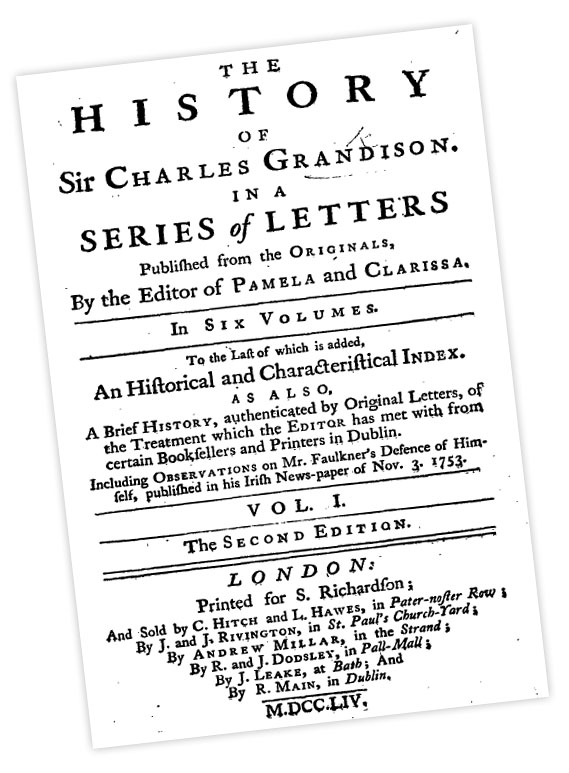 A lecture by Susan E. Whyman entitled ‘Letter Writing, Reading, and the Rise of the Novel: Jane Johnson of Olney and Samuel Richardson’ will take place at Convocation House of Oxford’s Bodleian Library on Tuesday 4 May 2010 at 1pm. In the lecture, which is organised by the Friends of the Bodleian, Dr Whyman (author of The Pen and the People: English Letter Writers, 1660-1800 [Oxford, 2009]) will use the Bodleian’s manuscripts of Jane Johnson of Olney (1706-59) and the letters of Samuel Richardson (1689-1761) to explore the complex relationship between reading, letter writing, and the rise of the novel in the eighteenth century. Admission is free, and all are welcome. Wine and sandwiches will be available at Chancellor’s Court after the lecture at a cost of £7 per person, for which bookings should be made with the Administrator. If you would like to attend, please RSVP to fob@bodleian.ox.ac.uk.
A lecture by Susan E. Whyman entitled ‘Letter Writing, Reading, and the Rise of the Novel: Jane Johnson of Olney and Samuel Richardson’ will take place at Convocation House of Oxford’s Bodleian Library on Tuesday 4 May 2010 at 1pm. In the lecture, which is organised by the Friends of the Bodleian, Dr Whyman (author of The Pen and the People: English Letter Writers, 1660-1800 [Oxford, 2009]) will use the Bodleian’s manuscripts of Jane Johnson of Olney (1706-59) and the letters of Samuel Richardson (1689-1761) to explore the complex relationship between reading, letter writing, and the rise of the novel in the eighteenth century. Admission is free, and all are welcome. Wine and sandwiches will be available at Chancellor’s Court after the lecture at a cost of £7 per person, for which bookings should be made with the Administrator. If you would like to attend, please RSVP to fob@bodleian.ox.ac.uk.
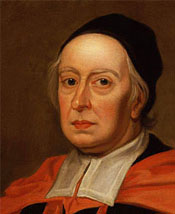
Detail from 'Portrait of John Wallis', by Godfrey Kneller. 1701. Oil on canvas, overall dimensions 23.8 by 144.8cm. (The Examination Schools, University of Oxford)
A roundtable symposium on ‘John Wallis as Correspondent and Controversialist’ will take place at Jesus College of the University of Oxford on 12–14 April 2010. Several leading authorities on the seventeenth-century mathematician will explore his multiple roles as correspondent, editor, cryptographer, and controversialist, as well as his relationship with his contemporaries, and the programme will also feature a guided tour of the University Archives (of which Wallis was keeper). Auditors are welcome. The symposium is the concluding event of the AHRC-funded Wallis Project (from late 2010, the editing of Wallis’s correspondence will form a sub-project of Cultures of Knowledge). A programme can be downloaded here (pdf). For further information, please contact Dr David Cram at david.cram@jesus.ox.ac.uk.
A major conference on ‘John Selden (1584-1654): Scholarship in Context’ will take place at Magdalen College at the University of Oxford from 24–26 June 2010. Held in conjunction with the Centre for Early Modern Studies and the Centre for the Study of the Book, and partly sponsored by Cultures of Knowledge, the event will allow over thirty distinguished international, interdisciplinary speakers to converge on the neglected intellectual contributions of one of seventeenth-century Britain’s leading scholars, antiquaries, and jurists, whose correspondence network extended to northern Europe and eastwards to Aleppo. For further information and registration details please visit the conference website.
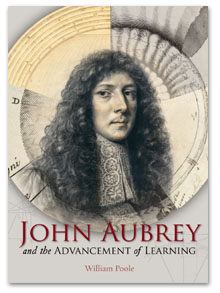 The intellectual contributions of John Aubrey, one of the best-connected scholars of the seventeenth century, a prolific correspondent, and a main focus of Cultures of Knowledge, will be brought to the fore in 2010. An exhibition entitled ‘‘My wit was always working’: John Aubrey and the Development of Experimental Science’, will run from 28 May–31 October 2010 in the Exhibition Room of the Bodleian Library. The exhibition is curated by Project participant Dr William Poole, who has also written a companion volume, John Aubrey and the Advancement of Learning. To be released by Bodleian Publishing on 1 May 2010, the Project is delighted to have been able to support the book, for which advance information is available here (doc) . The exhibition will also be accompanied by an ‘Aubrey Day’ on Saturday 19 June, and a series of lunchtime talks on Fridays throughout July and August; for full details, see here.
The intellectual contributions of John Aubrey, one of the best-connected scholars of the seventeenth century, a prolific correspondent, and a main focus of Cultures of Knowledge, will be brought to the fore in 2010. An exhibition entitled ‘‘My wit was always working’: John Aubrey and the Development of Experimental Science’, will run from 28 May–31 October 2010 in the Exhibition Room of the Bodleian Library. The exhibition is curated by Project participant Dr William Poole, who has also written a companion volume, John Aubrey and the Advancement of Learning. To be released by Bodleian Publishing on 1 May 2010, the Project is delighted to have been able to support the book, for which advance information is available here (doc) . The exhibition will also be accompanied by an ‘Aubrey Day’ on Saturday 19 June, and a series of lunchtime talks on Fridays throughout July and August; for full details, see here.
James Brown
March 11, 2010
Events, Lectures, Project Updates
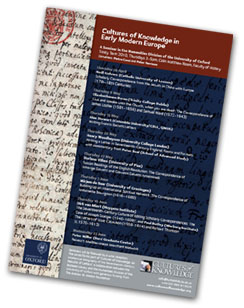 We are pleased to announce the inaugural Cultures of Knowledge seminar series, which will take place in Trinity Term 2010 on Thursdays at 3–5pm in the Colin Matthew Room of the History Faculty. Entitled ‘Cultures of Knowledge in Early Modern Europe’, and convened by Pietro Corsi and Peter Harrison, the seminar features an impressive programme of ten leading international authorities on seventeenth-century correspondents and correspondence networks, and papers and discussion will be followed by a wine reception. For the full programme and further details, please see here. The seminar poster (pdf) can be downloaded on the right.
We are pleased to announce the inaugural Cultures of Knowledge seminar series, which will take place in Trinity Term 2010 on Thursdays at 3–5pm in the Colin Matthew Room of the History Faculty. Entitled ‘Cultures of Knowledge in Early Modern Europe’, and convened by Pietro Corsi and Peter Harrison, the seminar features an impressive programme of ten leading international authorities on seventeenth-century correspondents and correspondence networks, and papers and discussion will be followed by a wine reception. For the full programme and further details, please see here. The seminar poster (pdf) can be downloaded on the right.
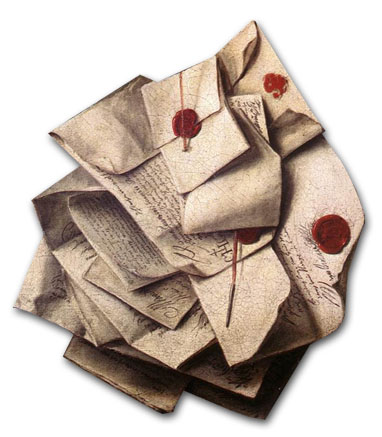 Papers are sought for a major conference on ‘Cultures of Correspondence in Early Modern Britain, 1550-1640’, which will take place at the University of Plymouth on 14-16 April 2011. According to the organizers, the conference aims to ‘enhance our understanding of epistolary culture and to challenge accepted models of epistolarity through the study of letter-writing practices in all their nuanced complexity, ranging from the textual production of letters, their subsequent delivery and circulation, to the various ways in which letters were read and preserved for posterity’. Abstracts should focus on one the following key themes:
Papers are sought for a major conference on ‘Cultures of Correspondence in Early Modern Britain, 1550-1640’, which will take place at the University of Plymouth on 14-16 April 2011. According to the organizers, the conference aims to ‘enhance our understanding of epistolary culture and to challenge accepted models of epistolarity through the study of letter-writing practices in all their nuanced complexity, ranging from the textual production of letters, their subsequent delivery and circulation, to the various ways in which letters were read and preserved for posterity’. Abstracts should focus on one the following key themes:
- The materiality of the letter: the physicality of correspondence (paper, ink, seals, folding) as well as the social context of epistolarity (composition, delivery, reading, archiving);
- Correspondence networks, the circulation of letters, postal systems, and modes of delivery;
- Letters, news, and intelligence;
- Authenticity, deception, and surveillance: forgeries, secrecy, ciphers, and codes;
- Women’s letters and the gendered nature of letter-writing;
- Epistolary literacies, social hierarchies, and the acquisition and diffusion of letter-writing skills;
- Manuscript letters and letters in print;
- The letter as a cultural genre and the rhetorics of letter-writing;
- Humanistic letter-writing practices and the familiar letter; letter-writing manuals and models; education, pedagogy and learning to write letters;
- Categories or types of letters: suitors’ letters, letters of petition, love letters, letters of condolence;
- Genres of printed letters: prefatory letters, dedicatory letters, address to the readers;
- Staging the letter: letters and letter-writing in drama;
- Editing and the digitization of correspondence.
Proposals of 300 words (including titles) should be sent to James Daybell (james.daybell(at)plymouth.ac.uk) and Andrew Gordon (a.gordon(at)abdn.ac.uk) by 1 July 2010. For further details, please see the full call.
 A lecture by Susan E. Whyman entitled ‘Letter Writing, Reading, and the Rise of the Novel: Jane Johnson of Olney and Samuel Richardson’ will take place at Convocation House of Oxford’s Bodleian Library on Tuesday 4 May 2010 at 1pm. In the lecture, which is organised by the Friends of the Bodleian, Dr Whyman (author of The Pen and the People: English Letter Writers, 1660-1800 [Oxford, 2009]) will use the Bodleian’s manuscripts of Jane Johnson of Olney (1706-59) and the letters of Samuel Richardson (1689-1761) to explore the complex relationship between reading, letter writing, and the rise of the novel in the eighteenth century. Admission is free, and all are welcome. Wine and sandwiches will be available at Chancellor’s Court after the lecture at a cost of £7 per person, for which bookings should be made with the Administrator. If you would like to attend, please RSVP to fob@bodleian.ox.ac.uk.
A lecture by Susan E. Whyman entitled ‘Letter Writing, Reading, and the Rise of the Novel: Jane Johnson of Olney and Samuel Richardson’ will take place at Convocation House of Oxford’s Bodleian Library on Tuesday 4 May 2010 at 1pm. In the lecture, which is organised by the Friends of the Bodleian, Dr Whyman (author of The Pen and the People: English Letter Writers, 1660-1800 [Oxford, 2009]) will use the Bodleian’s manuscripts of Jane Johnson of Olney (1706-59) and the letters of Samuel Richardson (1689-1761) to explore the complex relationship between reading, letter writing, and the rise of the novel in the eighteenth century. Admission is free, and all are welcome. Wine and sandwiches will be available at Chancellor’s Court after the lecture at a cost of £7 per person, for which bookings should be made with the Administrator. If you would like to attend, please RSVP to fob@bodleian.ox.ac.uk.



 Papers are sought for a major conference on ‘Cultures of Correspondence in Early Modern Britain, 1550-1640’, which will take place at the
Papers are sought for a major conference on ‘Cultures of Correspondence in Early Modern Britain, 1550-1640’, which will take place at the 
 Join
Join 